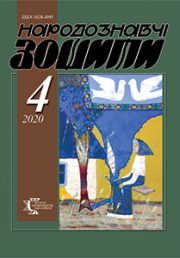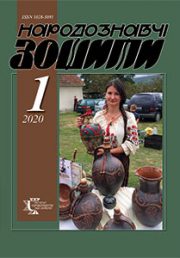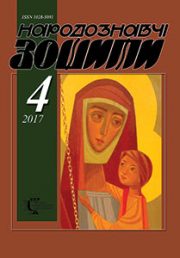The Ethnology Notebooks. 2020. № 4 (154), 881—891
UDK 761.1.071.1.031.2.02(477)”17/18”О.Бриндіков
DOI https://doi.org/10.15407/nz2020.04.881
CONTEMPORARY READING OF FOLK WOODCUT`S TRADITION IN THE ART OF OLEKsANDR BRYNDIKOV
SHPAK Oksana
- ORCID ID: https://orcid.org/0000-0002-9719-4432
- Candidate of art studies, Senior researcher
- Ethnology Institute of National Academy
- of Sciences of Ukraine
- Folk Art Department
- 15, Svoboda Avenue, 79000, Lviv, Ukraine,
- Contacts: e-mail: shpak.oksana@gmail.com
Abstract. Introduction, Problem Statement. Contemporary Ukrainian artist Oleksandr Bryndikov in his work successfully uses the artistic achievements of the folk woodcuts of the XVIII—ХІХ centuries. Based on traditional techniques, iconography, stylistics of ancient woodcuts, the artist creates his graphic replicas and independent art compositions, combines them with ornamental textile printing. This approach is especially actual today in terms of preserving traditional folk culture, strengthening the national achievements of contemporary Ukrainian art.
The work purpose: to study the prerequisites that served as creative impulses and contributed to the formation of the author’s manner by Oleksandr Bryndikov; to trace the connection of the artist’s works with authentic woodcuts of the XVIII—XIX centuries on the technique of performance, themes, iconography, stylistics.
The research techniques of the study are axiological method (to reveal the value features of ancient woodcuts and contemporary works), as well as the method of art analysis (to characterize the artist`s graphic work), and the comparative method (to compare the iconography and artistic features of Oleksandr Bryndikov’s works with authentic woodcuts).
Results. In the searching of creative ideas and ways of expression, Oleksandr Bryndikov turned to one of the least studied layers of Ukrainian art — folk woodcut. During 2010—2019 he created the significant artistic works: engravings printed on paper and canvas, which contained expressive allusions of the works of folk woodcuts of the XVIII—XIX centuries, and, at the same time, original author’s findings, which demonstrate a new reading of traditional techniques and artistic methods. In the paper artist`s graphic works of 2010th—2019th are analysed; his works` periodization is presented; art evaluation of works is given.
Conclusion. Based on the work of professional artist Oleksandr Bryndikov it is proved that the folk engraving on the wood belongs to the valuable spiritual heritage of the past and it can give a powerful creative impetus for the development of contemporary national art.
Keywords: Ukraine, woodcut, folk engraving, folk art, professional art, iconography, textile printing.
Received 11.06.2020
REFERENCES
- Senyshyn, O. Lviv Artist Oleksandr Bryndikov Invited to the Exhibition «Woodcut». 09.06.2015. Retrieved from: https://zaxid.net/lvivskiy_mitets_oleksandr_brindikov_zaprosiv_na_vistavku_derevorit_n1354418. (Last accessed: 16.01.2018) [in Ukrainian].
- Patrikeieva, N. (Not) Ordinary Lviv Residents. Master of Woodcut. Retrieved from: http://tvoemisto.tv/exclusive/neperesichni_lvivyany_mayster_gravyury_70506.html. (Last accessed: 27.02.2020) [in Ukrainian].
- Icon-Engraving`s Ancient Tradition is Being Restored in Lviv. 09.06.2015 р. Retrieved from: https://risu.org.ua/ua/index/all_news/culture/sacral_art/60203/. (Last accessed: 27.02.2020) [in Ukrainian].
- Metelskyi, R. 13 Woodcuts by Oleksandr Bryndikov. 11.06.2015. Retrieved from: https://photo-lviv.in.ua/13-derevorytiv-oleksandra-bryndikova/. (Last accessed: 15.03.2019) [in Ukrainian].
- Shpak, О. Woodcuts on Canvas by Oleksandr Bryndikov. Art Almanac «Artes». Retrieved from: http://artes-almanac.in.ua/art/articles/derevoryty_na_polotni_oleksandra_ Bryndikova.html. (Last accessed: 27.07.2015) [in Ukrainian].
- Skoczen-Marchewka, B. Oleksandr Bryndikov and His Woodcuts. Retrieved from: http://www.drzeworyty.pl/fascynacje. (Last accessed: 27.11.2019) [in Polish].
- Oleksandr Bryndikov. Retrieved from: http://iconart.com.ua/ua/artists/artist-41/oleksandr-brindikov. (Last accessed: 27.02.2020) [in Ukrainian].
- Oleksandr Bryndikov (Briundik). Retrieved from: http://art.lviv-online.com/oleksandr-bryndikov-bryundik/. (Last accessed: 27.02.2020) [in Ukrainian].
- Oleksandr Bryndikov. Woodcut. Retrieved from: https://www.youtube.com/watch?v=LhbCZHtbQl4#action=share. (Last accessed: 17.10.2019) [in Ukrainian].
- Lviv Artist Oleksandr Bryndikov Invited to the Exhibition «Woodcut». Retrieved from: https://www.youtube.com/watch?v=r5_fkn9P72o. (Last accessed: 08.03.2016) [in Ukrainian].
- Ukrainian Textile Printing and Engraving by Oleksandr Bryndikov. Master Dela. 24.12.2018. Retrieved from: https://youtu.be/33i3LlrFQ0k. (Last accessed: 19.10.2019) [in Russian].
- Album «Woodcuts by Oleksandr Bryndikov». Retrieved from: https://ww/w.facebook.com/media/set/?set=a.557558651014667&type=3. (Last accessed:14.02.2020) [in Ukrainian].
- Shpak, O.D. (2006). The Ukrainian Folk Engravings of the XVII—XIX Centuries. Lviv: Ethnology Institute of NAS of Ukraine [in Ukrainian].
- Grabowski, J. (1970). Folk Woodcut`s Images. Warszawa: Instytut Wydawniczy «Pax» [in Polish].
- Folk Icon. Retrieved from: https://www.facebook.com/narodna.ikona. (Last accessed:14.02.2020) [in Ukrainian].
- Exhibition of Woodcuts by Klaidas Navickas and Oleksandr Bryndikov. Retrieved from: http://zasliukc.lt/naujienos/331/klaido-navicko-ir-oleksandro-bryndikovo-medzio-raiziniu-paroda. (Last accessed:18.03.2020) [in Lithuanian].
- Klaidas Navickas Wood Cuts and Paper Cuttings Exhibition in Zasliai. Retrieved from: http://www.klaidaspapercuts.lt/karpiniai/main.php?id=naujienosID544. (Last accessed:18.03.2020).
- The Printshop. Retrieved from: https://www.facebook.com/maysternia.vybiyky/. (Last accessed:25.08.2019) [in Ukrainian].
- Virtual Museum of Folk Woodcuts. Retrieved from: http://www.drzeworyty.pl/. (Last accessed: 16.01.2018) [in Polish].
- Piwocki, K. (1934). Folk Woodcut in Poland. Warszawa [in Polish].






